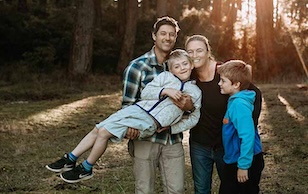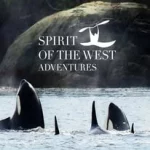Environmental Issues on the BC Coast
The British Columbia coast is a vibrant and dynamic ecosystem, providing an abundance of resources that support both human and animal communities. With so many people dependent on our coastal rainforests and marine environment, we put a lot of strain on the natural systems and processes that make up our part of the world. Questions of sustainability, equitable distribution and safety are becoming more and more pressing.
With the understanding that many of our guests are concerned with the well-being of the places that they spend their time, on this page we aim to help keep you on top of some of the many issues that affect us as kayakers but also as citizens of the planet. Education and awareness are key to creating a more sustainable world. Please know that there is always more than one side to every story.
Our aim here is to highlight how various activities and actions are negatively and positively impacting the ecosystems which we are so privileged to enjoy. With each summary below, please also find action steps for you to help make a positive impact regarding the issues featured on our website. This is by no means an exhaustive list of what is going on out in our wide world, so please let us know if you learn of other issues you think we should feature on our website.
Oil Pipelines and Tanker Traffic
One of the greatest threats to the entire coast is the proposed Northern Gateway Pipeline Project. This project has been proposed by the Enbridge Corporation. The pipeline would carry oil 1,170km from the Alberta tar sands through a pipeline to the coast of Kitimat, BC, where it would be loaded onto giant oil tankers for transport to various markets. There are many possible negative environmental outcomes from this proposed project including;
- Pipeline leaks anywhere along the 1170kms of distance the pipeline would travel
- The addition of supertankers (about 227 per year) to transport the oil from the port to market, with possible collisions and spills
- Increased noise both above and underwater from the tankers
- Encouraging the expansion of the Alberta Tar Sands, some of the most energy intensive and carbon-heavy oil possible
- Exporting Canadian refinery jobs overseas, resulting in net job losses
Enbridge claims that their pipelines are safe and that we would not have to worry about spills. However, in the last few years, Enbridge has had several environmentally devastating spills from their existing projects. Between 1999 and 2008, Enbridge itself lists 610 spills that released approximately 21 million litres (132,000 barrels) of hydrocarbons. For example, recently;
- Over 200000 gallons (6100 barrels) of oil was spilled in Romeoville, Ill a suburb of Chicago in September 2010. The amount spilled was most likely minimized due to the fact that the spill took place in an urban area and was noticed immediately. The proposed Canadian project would travel through many remote areas.
- On July 26, Enbridge Energy Partners reported that a 30-inch pipeline burst near Marshall, Michigan. The EPA estimates more than 800,000 gallons (19,500 barrels) of crude oil leaked into Talmadge Creek, a waterway that feeds the Kalamazoo River.
- In January 2010, Enbridge had a 3000 barrel of oil leak in North Dakota.
What is at stake?
- Many terrestrial and aquatic ecosystems stretching across Western Canada
- The ocean area that the tanker traffic would travel through is home to over 120 species of sea birds, 27 species of marine mammals (including Orca and Humpback whales) and many fish stocks (including salmon and halibut)
- An oil spill would have a devastating impact on the local First Nations communities who call the coast home. Traditional food hunting and harvesting grounds would be fouled by any oil spill.
- Ocean currents would be able to spread any spills rapidly with the potential to have dire effects on areas all over the west coast of North America.
What Can You Do?
- Sign the online petition
- Tell your Member of Parliament that you do not support the pipeline
Good News
- The House of Commons passed a motion that acts as an unofficial moratorium on tanker traffic. The vote is non-binding, however, and the Conservative government has indicated it will not follow it. To read more about the ruling click here
To Learn More
- For a two-minute overview of the project and concerns about it, click here
- www.pipeupagainstenbridge.ca
- www.pacificwild.org
- www.northerngateway.ca
Salmon Farming
Salmon farming has long been a contentious issue on the coast and around the world. There are many factors affecting the wild salmon on the BC coast, including stream habitat degradation, ocean warming due to climate change and offshore bycatch, but farming of Atlantic salmon in open-net pens is one of the most obvious and easily remedied factors.
Negative and/or Challenging Factors for Wild Stocks and the Environment
- The density of fish in the pens creates a breeding place for disease, infection and parasites
- The fish are farmed in open net-pens, which allows disease, infections and parasites to be transferred to wild stocks
- The fish are often treated with antibiotics to combat the disease, which also spills out into the surrounding life. The exposure to antibiotics also leads toward antibiotic resistance.
- Sea lice are naturally occurring in the environment, however, small wild salmon are now exposed to these parasites in greater numbers than normal because of the location chosen for salmon farms.
- The pen nets are treated with fungicides to keep them clean; this again gets released into the delicate ocean ecosystem.
- Atlantic salmon are carnivores and eat a great deal of smaller fish and proteins, resulting in a net protein loss
- Their feed is created by harvesting huge quantities of these fish in far off countries such as Chile, processing and then shipping it to Canada. Marine ecosystems around the world are dependent on these small fish, as they are an essential part of the food chain.
- There is also a great deal of carbon released through the gathering, processing and shipping of the food.
- Atlantic salmon are not native to the Pacific Coast
- Escaped Atlantic salmon displace the native stocks
- The fish farms on the BC coast are primarily owned by interests outside of Canada
What is at stake?
- Wild salmon are an essential part of the coastal ecosystem for both the ecosystems that depend on them and the humans that benefit from them
- Fish was and is an essential part of First Nations’ way of life
- Fisherman and woman have for many years depended on the wild salmon for jobs and income. Fishing is big business in BC.
- Tourism which generates millions of dollars in revenue annually is often dependant on the pristine environment and the feeling of being in the wilderness. If the wild salmon stocks collapse it affects creatures big and small up and down the food chain. For example, the Orca whales, which so many guests come to Spirit of the West Adventures to see, could be negatively affected and they may change location due to availability of food, become sick, starve or even die.
- There are very few jobs directly associated with fish farming in comparison to those of the fishing and tourism sectors in British Columbia.
What can you do?
- Boycott farmed fish. Do not purchase farmed salmon in grocery stores; ask where the salmon comes from at restaurants etc.
- Eat only fish deemed to be sustainable. Click here to learn more about the Ocean Wise Sustainable Seafood program.
- Support the research and continued efforts of researchers such as Alexandra Morton and others who work diligently to ensure that the public knows what is going on in fish farms.
- Support organizations working to find a sustainable method of fish farming, such as Save Our Salmon, and write to industry and government to encourage them to take advantage of these solutions (such as closed containment)
- Write your local government representative to let them know what is important to you
To Learn More
- Watch videos posted on the blog Calling from the Coast http://www.callingfromthecoast.com/
- Check out the information found on the Salmon are Sacred website www.salmonaresacred.org
- Subscribe to the Common Sense Canadian email updates http://thecanadian.org/
- View challenges and solutions at http://www.saveoursalmon.ca/
Independent Power Projects (IPPs)
Independent power projects or IPPs sound great when you first hear about the concept. Small run of the river projects that will generate cleaner energy, without building dams – what could go wrong? There are many problems, however.
Negatives
- British Columbia currently has a surplus of energy. Additional energy harnessed would likely be for export to the US markets.
- During the time of year that most energy would be created and collected (the winter run-off) BC actually has a surplus of energy.
- While the run of the river sounds harmless, massive quantities of water are diverted from the rivers by way of pen-stocks (large pipes for water diversion), then into powerhouses and through generators.
- The temperature of the water being returned to the river is often effected and the delicate freshwater ecosystem including fish species such as the already threatened salmon population and riparian zone (the area next to bodies of fresh water) are negatively effected.
- The idea is that if a project will generate under 50 megawatts of power then they are exempt from many of the rigors of the environmental impact assessment process. Projects 49 megawatts and under can still mean very dramatic changes to the ecosystem and landscape.
- There are hundreds of proposed power projects in BC, nearly every stream and river in the province has an application for power generation pending.
- The power is often set to be generated in areas that until now have been remote and pristine wilderness settings. Obviously, this has negative effects on ecotourism operations such as Spirit of the West, but also means that the power needs to be transmitted long distances to get to market. This translates into hundreds of kilometres of power lines and transmission corridors which means huge swaths of land cleared of trees and vegetation suppressed through the use of herbicides and other chemicals
- Once the power generating station and lines are in place there are very few jobs for the local residents.
- The roads and infrastructure needed to maintain the generating stations and equipment mean more invasive and negative effects on the environment and it’s inhabitants.
What is at stake?
- Loss of fish and other habitats when streams and rivers are diverted for the penstock.
- Cumulative effects from dozens of small projects in one area not necessarily considered together in environmental assessments.
- Loss of wilderness through the construction of roads and power lines.
- Contracts negotiated between the government and the IPP builders pay more than the power can be sold for in BC, meaning our rates will go up.
To Learn More
- Visit websites such as Friends of Bute Inlet. This is a group of concerned citizens that have been working to keep Bute Inlet free of power projects. Their website also examines other power projects and proposals in British Columbia.
- Watch a fantastic movie titled 49 Megawatts which looks at the problems with these so-called ‘run of the river’ projects which will generate less than 50 megawatts of power.
- Visit the Ashlu River Project website. This power project has gone ahead. See what the project looks like.
- Click here to get more info about the Toba Inlet power project (also close to Quadra Island – our home)



